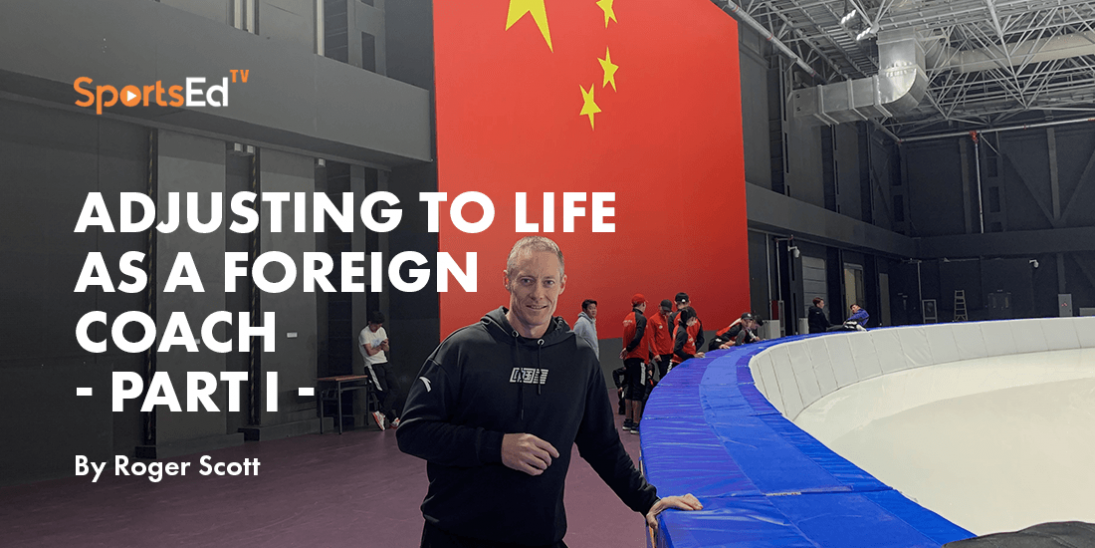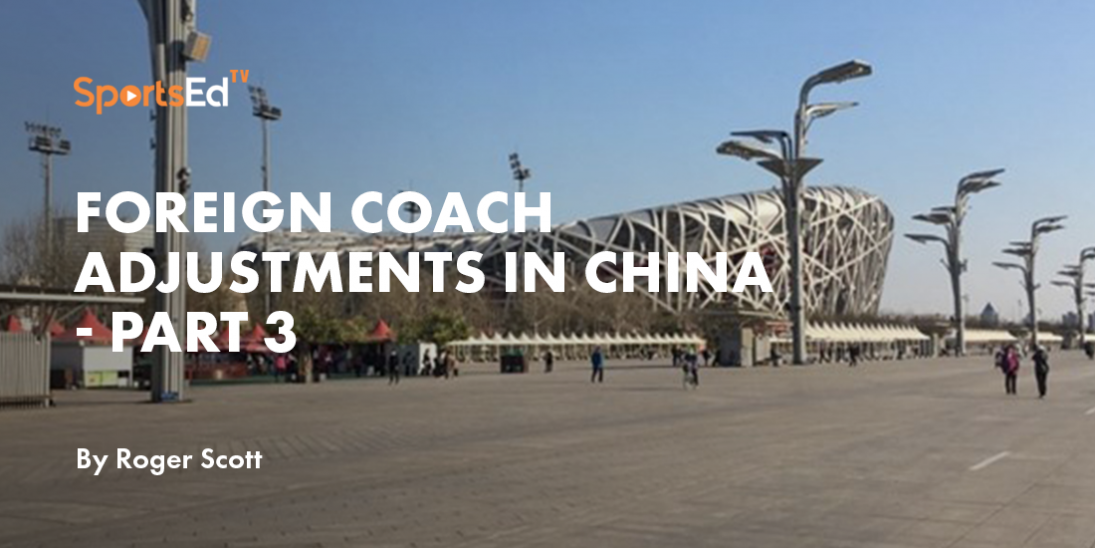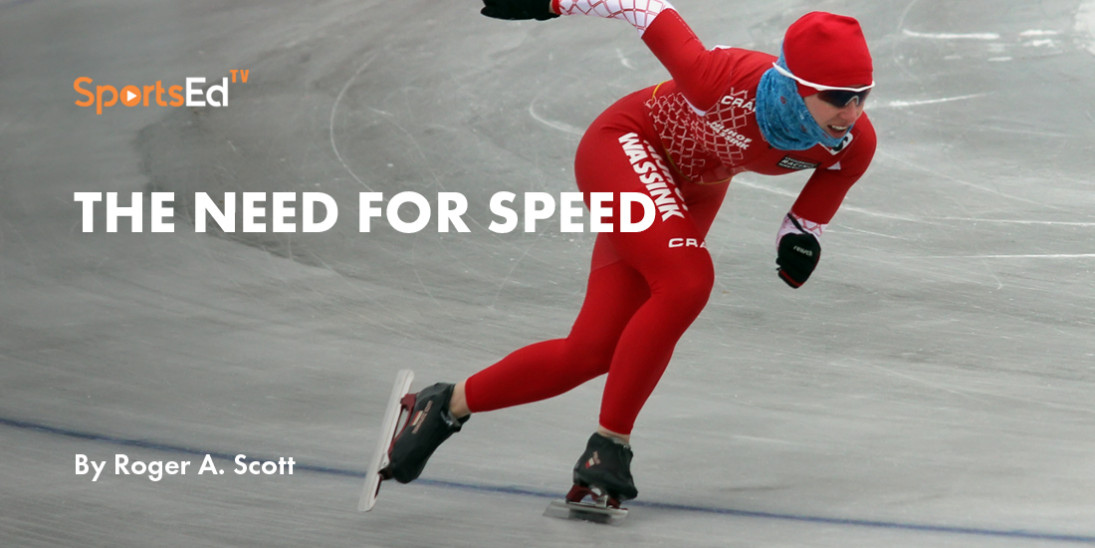Mental Health
Welcome and thanks for visiting...

Foreign Coach Adjustments in China Part II
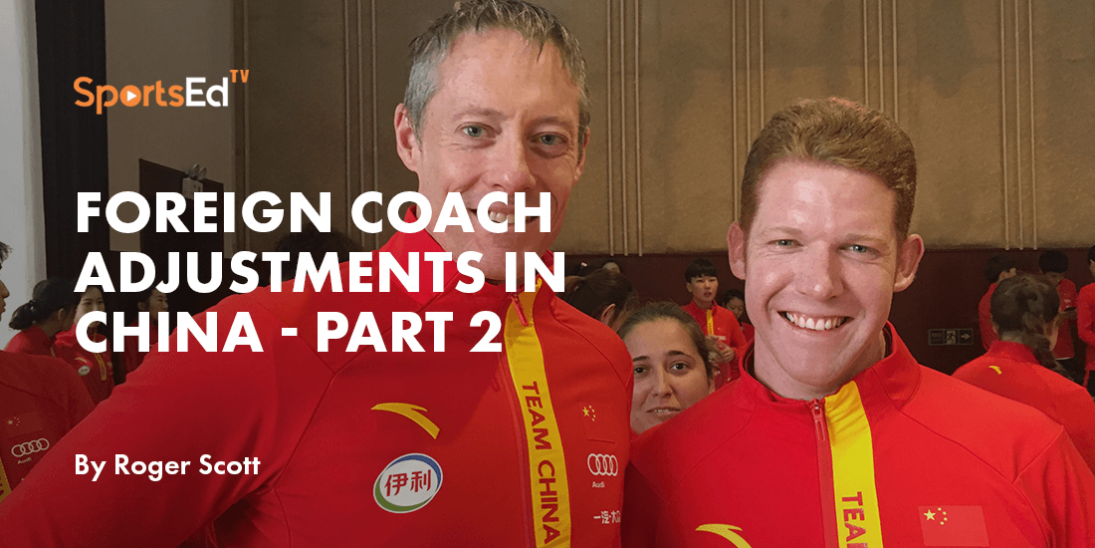
This is a continuation of my 4-part blog series for current or aspiring coaches who are considering working in a foreign country. In this case, my experience in China as a Strength and Conditioning Coach with the Chinese Olympic Committee (for both their Long Track and Short Track Speed Skating national teams) is chronicled.
Part 2 covers our ever-changing performance training facilities and living accommodations in China, the international colleagues I worked with. The translators were most valuable. The things you take for granted living in the United States and being ready for anything are included.
Performance Training Facilities
Overall, we had solid training environments for our off-the-ice / dryland training. There were times however where you had to be creative such as sharing a hotel conference room (all with portable equipment) or a hallway with no equipment (doing a body weight only 30-minute core training session).
We also had one facility (a nice spacious one up north in Hailar) where the carpeting began tearing apart soon after its installation. Submitting requests for repair didn’t seem to work either. We never knew who was really in charge of that. Nobody from Speed Skating, that is for sure. Back in Beijing (Fall 2019), we lived and had our performance training sessions at the national shooting & archery base. The property was a large and very highly secured compound with various types of performance training facilities.
However, they would only allow our Long Track team (at least 70-80 skaters) use of one indoor training room with 4 power racks (each with an Olympic lifting platform), and a handful of other items. In this same building there was an additional room full of equipment, along with a pool upstairs.
All were off limits. I guess our team leader didn’t negotiate that very well. Thankfully we had an outdoor track we could also use…when it wasn’t locked, which was about 1/3 of the time. But, when I was moved (I would say promoted) to the Short Track team 20 minutes away in Shougang, their training facilities had EVERYTHING as well as full use of EVERYTHING….and in 2 different buildings. No restrictions. It was only walking distance to our living and dining quarters (which I might add were pretty exceptional and a step up from Long track as well).
**Please note the Performance Training area for Long Track would soon be moving to the same complex where their permanent indoor oval is located in southwest Beijing (which opened in October 2019).
Here is a summary of our 6 training locations throughout China and Canada:
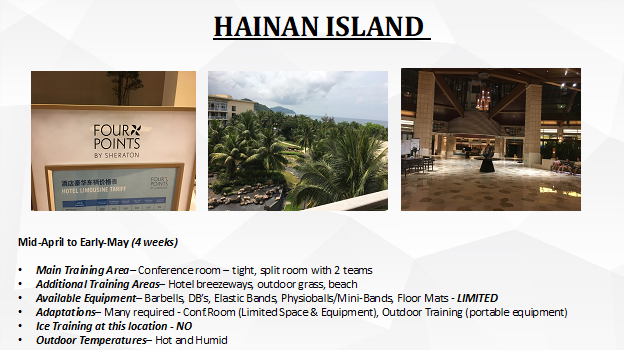
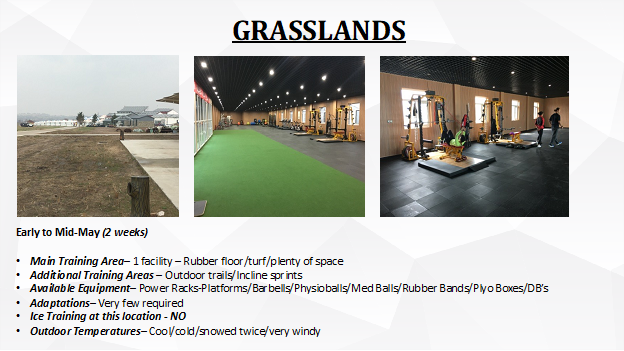
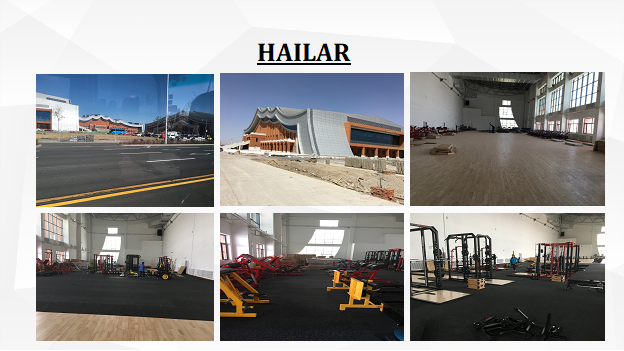
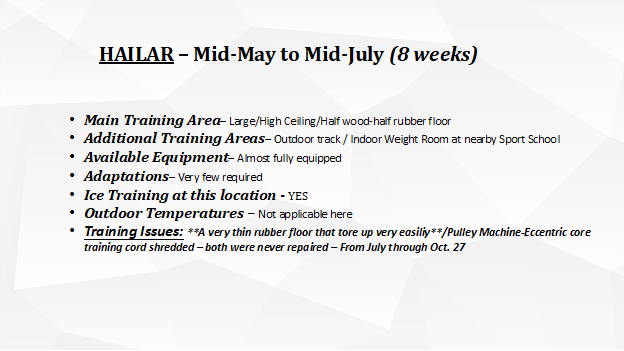
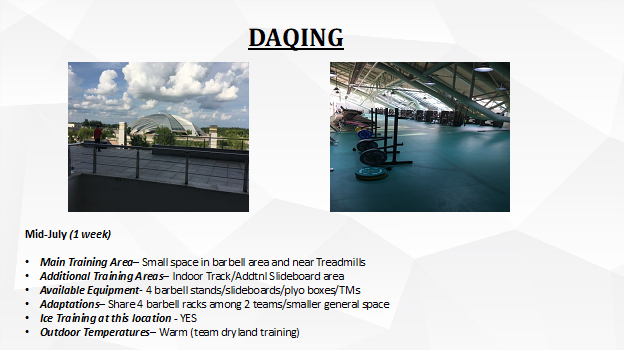
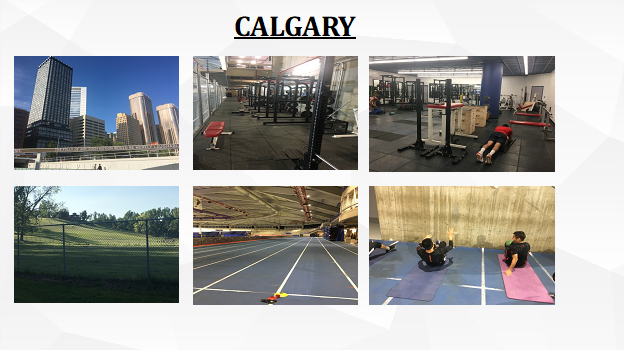
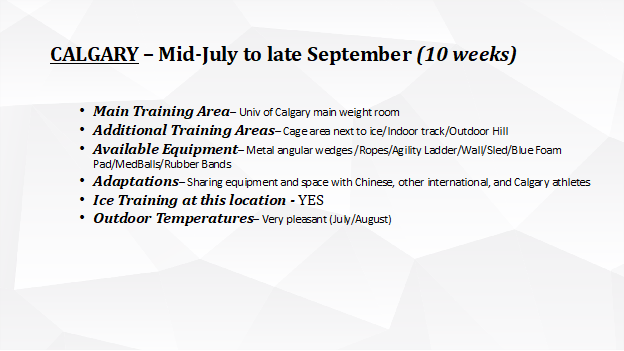
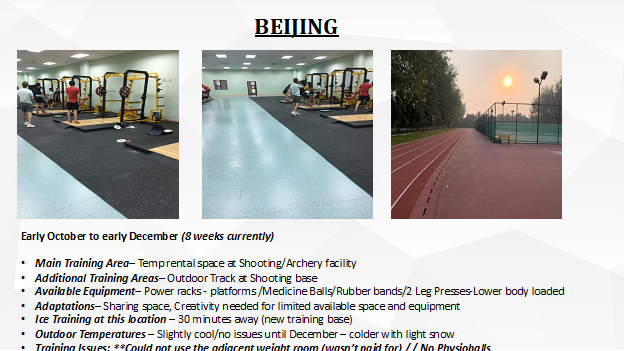
Living Accommodations
Our housing experience was just that, an experience! We saw the GOOD, the BAD, the UGLY, and the ODD over my 10 months with the National Speed Skating team. From a 4-star hotel environment in Hainan Island (which reminded me of the hotel my wife and I stayed at in Costa Rica several years ago), to 3rd rate athlete dorms at the China Shooting & Archery base, to odd circular looking tent-like structures called Yurts (Grassland Hunting Grounds – near Chengde, Hebei). The Yurts on the inside were pretty good, surprisingly. And since it seemed like our Speed Skating team was at times, a circus, it was fitting that the inside ceiling of a Yurt resembled a circus tent. It was life under the big top.
For the first few months all the coaches had their own rooms. Then one day, right out of nowhere, I believe it was in Daqing (a temporary 2 week stay, thankfully) all the foreign coaches are asked to double up. And some of these hotel (or dorm) rooms were tight and little or even no closet space provided. So that was fun. You really have to be able to co-exist with your roommate in this circumstance. Fortunately, most of the time I shared with my buddy Scott Andrews, from Perth, Australia. That worked out great, despite our 18-year age difference. We made the best of what could be an uncomfortable situation. I can’t say enough good things about Scott.
Scott Andrews and I at the 1000 Day Countdown
Festivities (w/ photobomb from Sarah Snodgrass)
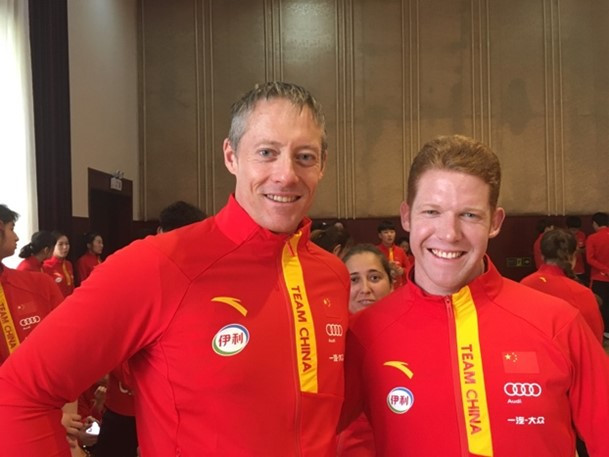
And I can’t talk about our housing without mentioning being in 3 hotels in 2 days. This was in Hailar / Hulunbuir (Inner Mongolia region of China near Russia). We check-in at one hotel, then they move us (long track) out so they can put the short track team in there. The next hotel we move to, as I was told, would not allow foreigners to stay there. So, we waited in the lobby for what felt like a couple of hours before they moved us back to our original hotel. Somehow, I was given a suite and suddenly I was living like a king. It was unreal. Of course, it was too good to be true because within 24 hours everyone moved into a completely different, and much larger hotel in order to house both Long Track and Short Track teams.
Late in 2019, when I was moved to work for the Short Track team, I found that the living accommodations (in Beijing) quickly improved. I will speak about that later.
(Hainan Island – Four Points Sheraton) The “GOOD”
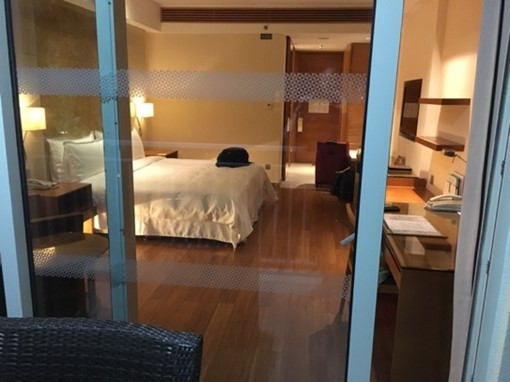
(Shougang /Beijing - Athlete Dorm – Short Track) The “GOOD”
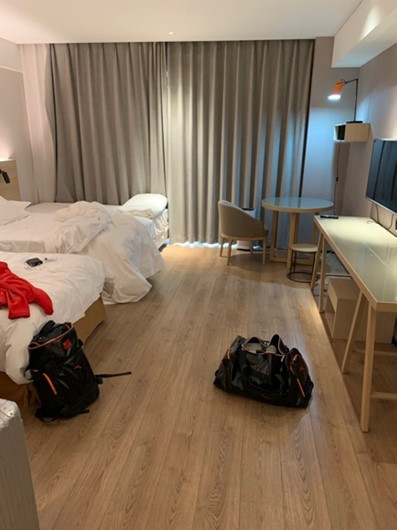
A.
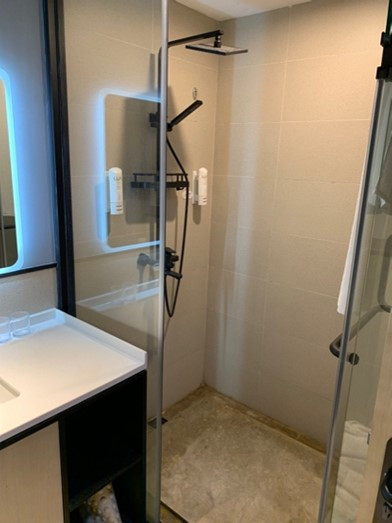
(Daqing) The “BAD”
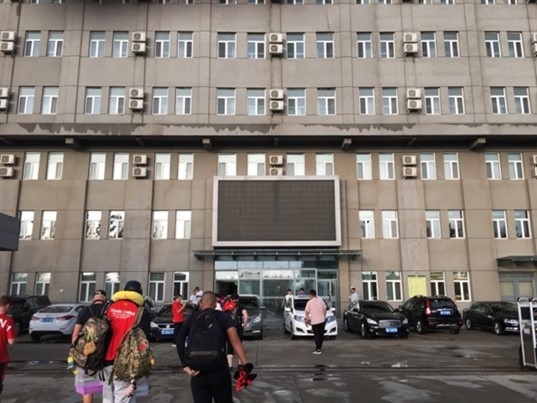
(Shooting & Archery Base Dorm - Beijing) The “UGLY”
A.
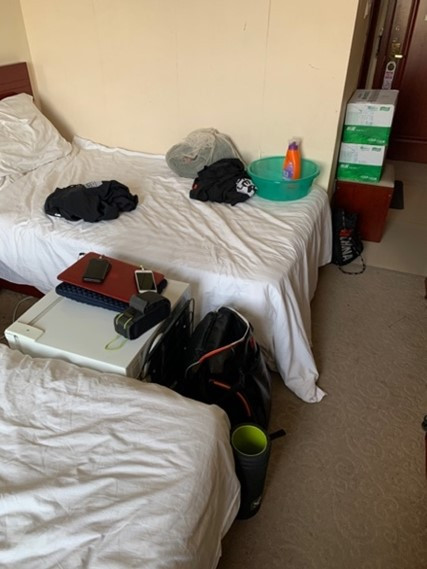
B.
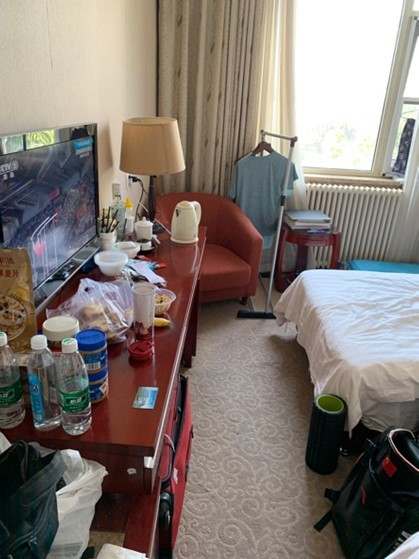
Yurt (Grassland Hunting Grounds – Chengde, Hebei) The “ODD”, yet surprisingly “GOOD”
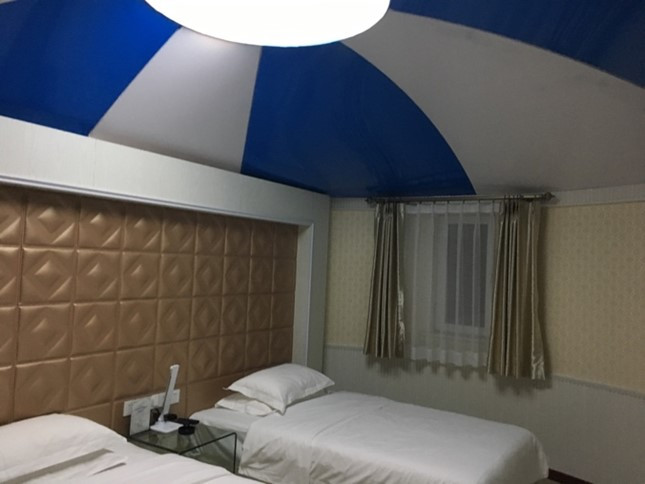
Huge suite (Hailar) The “REALLY GOOD”...that never was
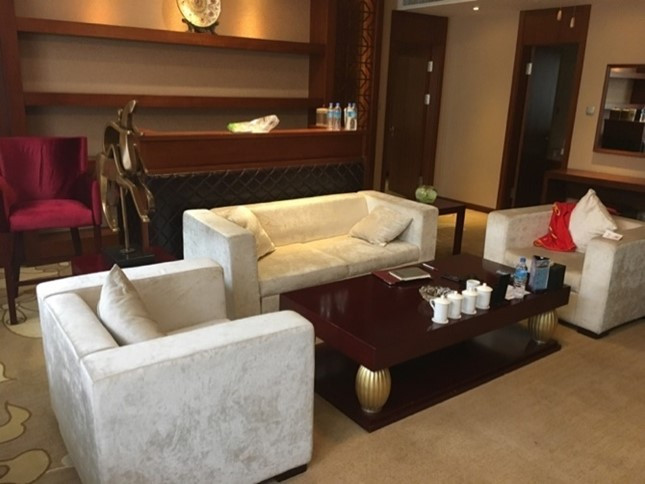
Best Western Plus – Calgary, Alberta (All westernized amenities plus restaurants, indoor pool and 10 minute train ride to downtown Calgary)
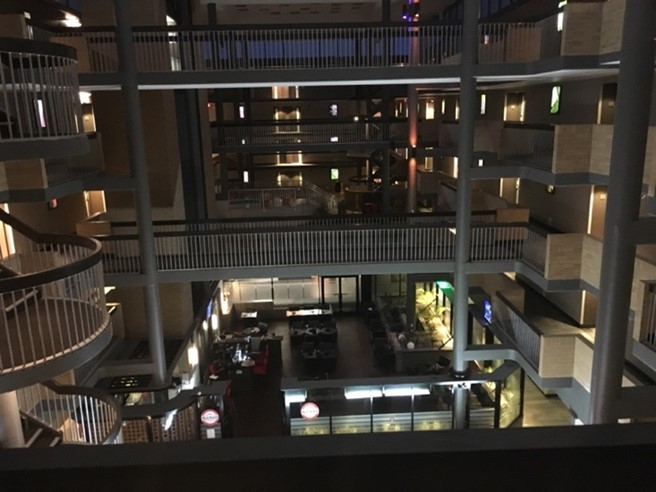
International Colleagues
After recalling all the staff from around the world whom I worked with in China, it turns out that 12 different countries were represented (including the USA). There aren’t too many jobs where you can live and work with fellow colleagues from that many countries at one time. Pretty amazing if you ask me. The highest percentage of the coaches were from the Netherlands, as they historically produce the best Long Track Speed Skaters in the world. The group included: USA, England, Australia, Canada, Netherlands, China, Korea, Spain, Brazil, Norway, Russia, and Serbia.
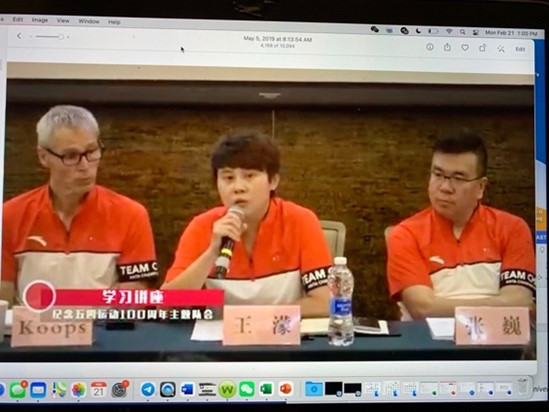
Center: Wang Meng – Overall Director of Speed Skating and 4-time Gold Medalist in Short Track. She is the most decorated Winter Olympian in the history of China
Left: Arie Koops - High Performance Manager / Administrator for Long Track Speed Skating
Right: Towering Kunlun (We Chat name) Chong Wi – Team Leader for Long Track Speed Skating
I think it is only fair to mention as many of the coaches with Speed Skating as possible that made my experience one I will never forget. Some of our We Chat audio messages sent to one another were classics! And many of the foreign coaches even formed their own We Chat group text called “Let’s Eat & Drink” for when we wanted to get out on the town in whatever city we were in.
Foreign Coach Staff at Hainan Island, April 2019
Group A
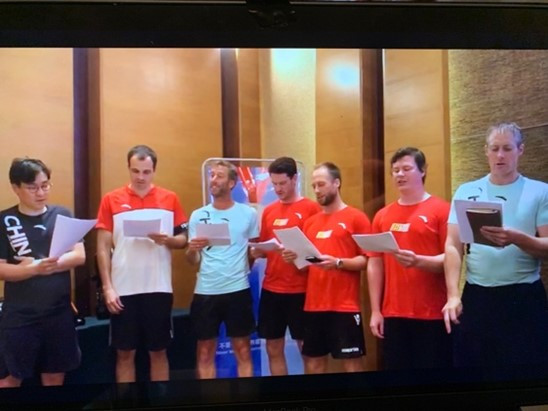
From left to right:
- Kim-Sun-Tae – Head Coach, Short Track – South Korea
- Luka Kovacevic – Strength & Conditioning Coach, Short Track – Serbia / USA
- Rutger Tijssen – Executive Head Coach – Long Track – Netherlands
- Twan ten Haaf – Head of Sport Science – Netherlands
- Joop Wiersema - Strength & Conditioning Coach, Long Track – Netherlands
- Josh Hunt – Athletic Trainer, Short Track – USA
- Roger A. Scott – Strength & Conditioning Coach, Long Track / Short Track - USA
Group B
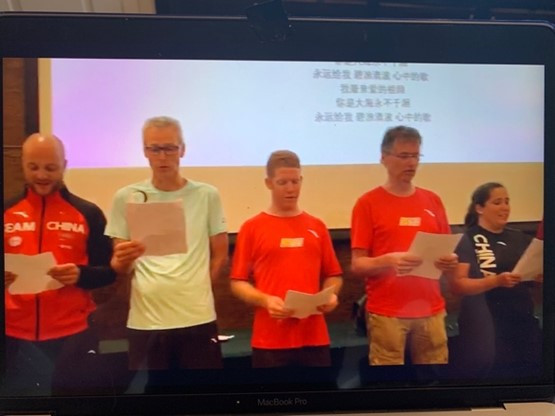
From left to right:
- Lieuwe Mulder – Long Track Skating Coach – Netherlands
- Arie Koops – High Performance Manager – Netherlands
- Scott Andrews – Strength & Conditioning Coach, Long Track – Australia
- Aart van der Wulp – Long Track Skating Coach – Netherlands
- Sarah Snodgrass – Athletic Trainer, Long Track – USA
Group C
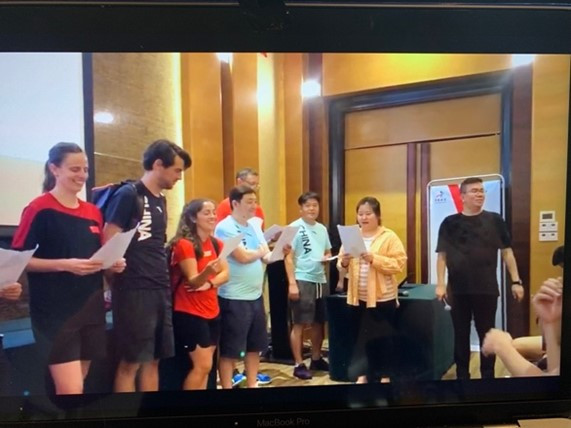
From left to right (excluding the 2 on the far right) :
- Anne Hinley – Athletic Trainer, Short Track – USA
- Jan-Willem Dantuma - Long Track Skating Coach – Netherlands
- Monique Marcelino – Athletic Trainer, Long Track – USA
- Turquoise shirt – Don’t recall his name
- Vadim Sayutin – Long Track Skating Coach – Russia
- Lee Jaesik – Long Track Skating Coach (The Coach I worked with the most) – South Korea
Josh Hunt (USA) …and yes, I still have that bottle!

Kelly Ellis – Athletic Trainer (USA)…her contract ended just prior to Hainan Island trip
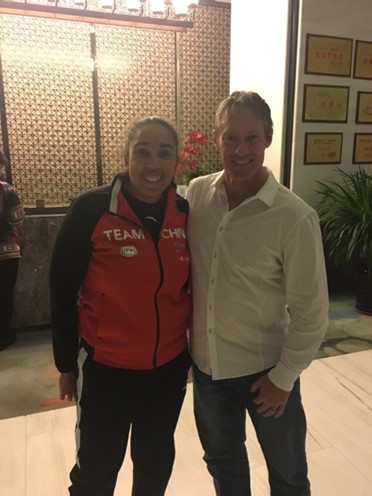
Scott Andrews & Dr. Dionne Vernon, PT, DPT (USA) – she worked with Table Tennis
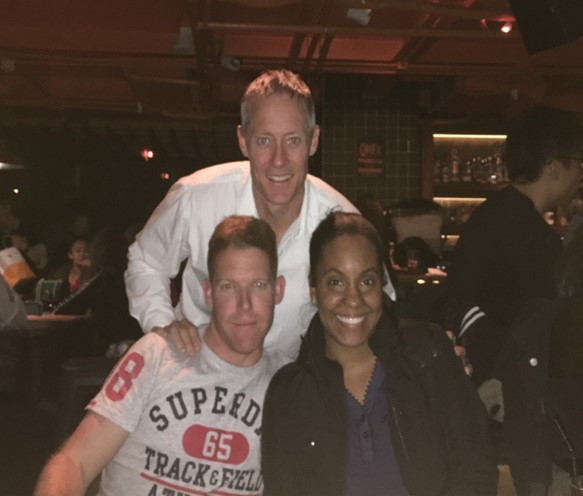
Tom Ranney – Athletic Trainer – Long Track (USA)
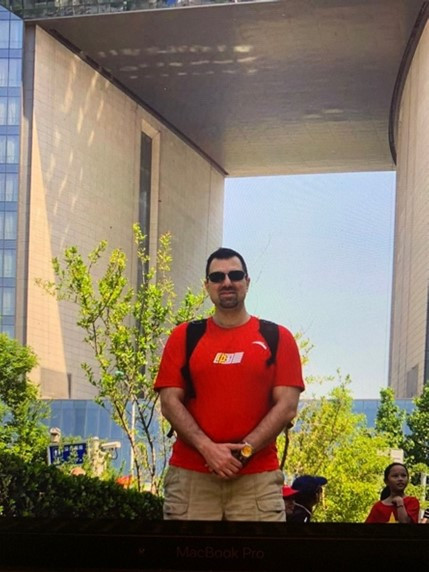
A few other Speed Skating Strength & Conditioning Coaches not part of the group photos above:
- Felipe Sanchez – Spain (Current China National Olympic Judo Head Coach)
- Alex Wright – USA
- Sebastian Vargas – USA
- Rodrigo Andrade – Brazil
- Samuel Brandao – Brazil
Translators
Never had I worked in an environment where a Translator was needed. There is a first for everything. China provided many firsts. My main translator, Doris, was awesome. Probably around 90% of my athletes had no knowledge of the English language. And we use technical terms with strength training, speed training, and Olympic lifting. Your translator is your “mouthpiece” and critical to your success as a coach, in my opinion anyway. This is especially true in a fast-paced atmosphere with elite level athletes. There were times I could work without her, when it was training drills and warmups that we had done several times prior, and they were familiar with. But any new information really required assistance. All our translators for both Long Track and Short Track were females between the ages of 18 and 25, approximately. That was an interesting dynamic pairing them up with male coaches, many of which were between 30 and 60. But it worked. And I am thankful for her help, right down to ordering pizzas and contact lenses for me. Doris was a lifesaver. And the job of a translator in China (and other places I imagine), should never be overlooked or underestimated.
DORIS (Left) – Outside the Long Track new training oval in Beijing
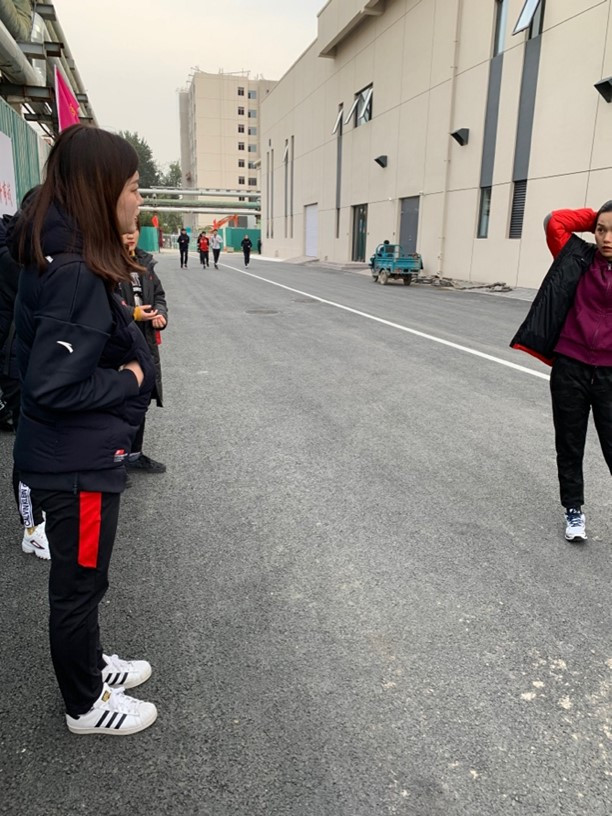
The Things You Take for Granted
There are many, many cultural differences between China and the United States I quickly discovered. Let’s take laundry for example. We are used to a washer and dryer, even if we must use a laundromat. I never saw a dryer anywhere we went in China. The best we could do would be to hang our clothes up to dry. That being said, the washing machines we used there have an exceptional spin cycle, so that the drying process is minimal. And since the buttons are in Chinese, if you are by yourself, you use a translator app on your phone. Place the phone in front of the keypad like you are taking a photo and it will give you the closest English translation possible right there in real time (same thing when you go food shopping in China). There were several places where our coaches did not have access to a washing machine. So, when that happened, it was back to pre-historic times and we washed our clothes in the bathtub or even in a bathroom sink, and then ringed them out by hand. That might be a good forearm workout, but after a while, it got old. Our hotel in Calgary had a standard coin operated washer and dryer, and to me, that was absolutely amazing!
Washing Machine Used in China
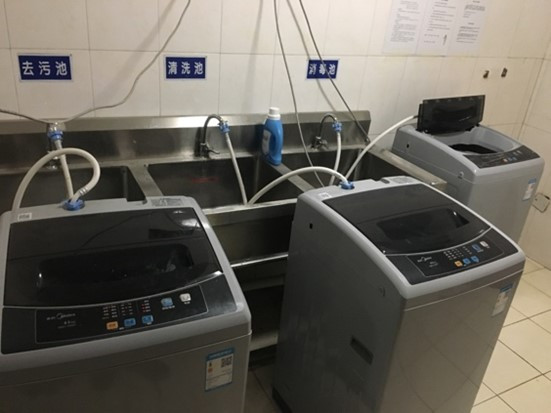
The “Suitcase of Necessities” My Wife Brought to Calgary
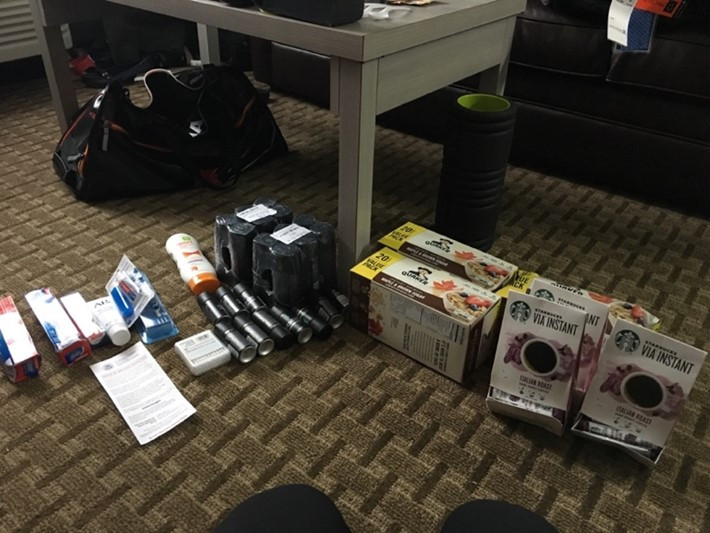
*Contents include: Starbucks VIA Packets, Instant Oatmeal, Axe Body Spray (regular & minis), various types toothpaste, and an electric toothbrush.
Thanksgiving Dinner – 2019 – Pizza Hut, Budweiser, and Dessert (living it up!)

Additional items that are difficult to come by over there include ice (except in a nice hotel), strong coffee (except at a Starbucks), and the normal western grocery items (milk, cereal, eggs, frozen foods, deodorant, etc). I found one non-traditional grocery store in Beijing that actually sold half gallon milk (I was shocked) as well as western liquor (if that is what you are into). During our 2+ months in Calgary during the summer of 2019, my Wife Julie came to visit me and brought me a suitcase full of Starbucks VIA packets (just add hot water), as well as instant oatmeal. So now, if I chose not to eat at the Long Track team breakfast buffet (which was often), I would be set for a more proper westernized breakfast. Haha. And speaking of water, all we drank was bottled water the entire time. Just an FYI.
I can’t help also mentioning something funny. Many places in China have normal toilets that we are used to in western civilization. But many only have a hole in the floor. I made darn sure I avoided those types of toilets (in the sitting, or should I say squatting position) as much as possible. Only once was I forced to use one. Had no choice at that moment. As flexible as my hips are, getting into that position was harder than you would think, and not fun either. I will spare you the details. One of my Chinese Skating Coaches showed me how there are many Chinese who people can squat with both legs side by side, closed. I couldn’t do it. That made me think of how they could use those types of toilets there. It was one of many cultural differences I experienced. And please…don’t forget to bring your own toilet paper with you when you venture out in Beijing, or other parts of China. It isn’t readily available there as you are accustomed to.
The classic China toilet!
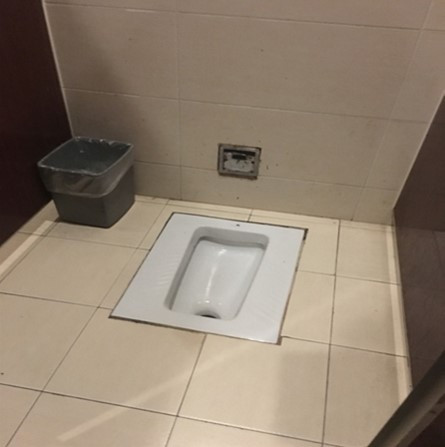
Finally in this category, communication with the outside (western) world was always an adventure. With China’s regulated internet (the firewall), ONE THING YOU MUST DO BEFORE LEAVING THE USA, or your respected home country (for China in particular), is to SETUP A VPN. I cannot stress this enough. A VPN is a Virtual Private Network. You go online and set it up for both your phone and laptop. This will make it appear as if you were in another country, thus allowing for full internet access. Once you arrive in China, you cannot go online there and arrange your VPN (due to the obvious firewall). I used Express VPN for about 13.00 per month. But there are many others to choose from. WIFI was also difficult to come by in certain regions of the country where we were training. That would impact your VPN, and thus be a potential aggravation. And this could impact talking with a loved one on FaceTime, keeping up with news/current events from around the world, or even watching USA based sports at 3 or 4am from China, like I did. And during certain times of the year when big events run by the government take place in China (ex-World Military Games), if you have a Chinese phone number (as I was required to), accessing anything online through your phone (or laptop) may be a bit more difficult. You may need to replace the SIM card in your phone with your own home country’s SIM card. It worked better for me during that period but did cost me a little bit of money through AT&T for daily international use. You do what you have to do, however.
Be Ready for Anything!
When you are working in a foreign country, especially China, you have to be ready for anything, and you just have to go with the flow of their schedule and not complain about it (except maybe amongst your foreign coaching colleagues. It is a leap of faith in some regards. Most of the time we were kept in the dark as to where were staying or what the travel itinerary was. It was a mystery of sorts. We would have to continually ask our translators if they knew what was going on when it came to a trip. I can remember arriving at these Hunting Grounds, part of their “Grasslands” (8 hour drive NE of Beijing) near Chengde, Hebei, for more preseason (non-ice) training, late at night and in the middle of freaking nowhere. If not for Google Map GPS, I would have no clue where we were, geographically. We arrive to representatives dressed in camouflage. I am thinking, is this some military base, and what is going to happen next? They just worked there however and were not part of the military.
Another trip included an approximately 19-hour travel day, arriving very in way north China (Hulunbuir / Hailar) in the inner Mongolia region. By the time you get your room and to sleep it’s after 2am. I was never told we were leaving at 830am the next day until about 30 minutes prior…and this was to merely tour the new facilities we would be using for both ice and performance training. Thankfully a translator called my room to let me know. It was a surprise I did not entertain well. The point here is that communication is always critical, especially where there is a significant language barrier. But, as foreign coaches, we adjusted to it and sucked it up. You have no choice but to adjust, if you want to be a part of a national team like this.
And the topper (mid-December 2019) was my fellow Strength & Conditioning Coach, Scott Andrews (Perth, Australia) and I finding out that our Work Visas / Residence Permits were not able to be processed / renewed in time (prior to expiration in 48 hours) and that we would have to return to our respective home countries to renew our Work Visas (within those 48 hours) and then return to China as soon as possible. To complicate matters, my Wife had a plane ticket to Beijing and was leaving Atlanta in 2 days to visit me for Christmas and New Year’s. So as a result of our VISA surprise, I had to call her immediately and hope we could get a refund from the airline (worth a few thousand dollars). Thankfully we did, but like I said, when going over there, you have to be ready for anything.
Oct. 27th photo – Trip Itinerary from Hailar to Beijing sent to head coaches but nobody else. An example of how we were usually kept in the dark about travel itineraries. It’s nice to know what your next day’s schedule looks like. Because of the mystery, it almost feels as though you are seeing something you shouldn’t be seeing. Haha. And it’s funny how on this day our flight ended up delayed several hours due to a snowstorm and everything got cancelled anyway. (Secret schedule courtesy of one of the Dutch skating coaches the night before at dinner)
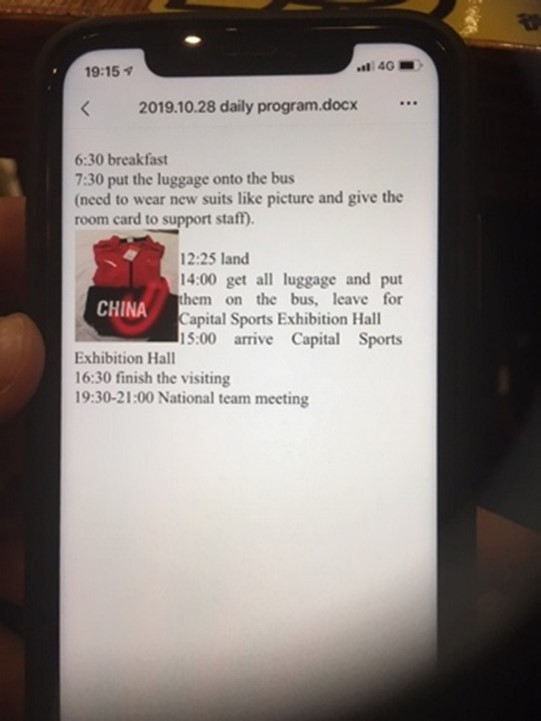
END PART
In PART 3 we will cover: “Food” For Thought, My Mishaps Along the Way, Off Time, The Chinese National Anthem, The 70th National Day Parade (Military & Civilian), Pros vs Cons, and Long Track vs Short Track.
Read more:
Adjusting to Life as a Foreign Coach Part I
Foreign Coach Adjustments in China Part II


